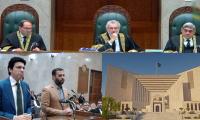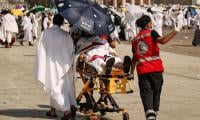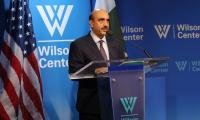UNITED NATIONS: The UN Assistance Mission in Afghanistan (UNAMA) has called for an immediate end to fighting in urban areas, as the Taliban continues a ground assault in the south of the country.
UNAMA said civilians are bearing the brunt of the violence as fighting enters cities, according to a post on its official Twitter account. The Taliban are advancing on provincial capitals, after making gains in rural areas and smaller cities, UNAMA said.
Meanwhile, US diplomat Zalmay Khalilzad has said that the Taliban and the Kabul government are far apart in US-backed talks on bringing peace to Afghanistan, with the Taliban demanding “the lion’s share of power” in any new government. “At this point, they (the Taliban) are demanding that they take the lion’s share of power in the next government given the military situation as they see it,” he told the Aspen Security Forum in an online conference in Washington.
The deadlocked negotiations in Doha were the subject of a telephone call on Tuesday between US Secretary of State Antony Blinken and Afghan President Ashraf Ghani, while agreeing on the need to accelerate talks, the US State Department said. Blinken and Ghani also “condemned the ongoing Taliban attacks and displacement of the civilian population,” State Department spokesman Ned Price said.
Price, the State Department spokesman, told reporters that the Taliban would become “international pariahs” if they renege on their commitment to the negotiations and the concern on the part of all of us, one of the many concerns, is that the result will be civil war.
“Speaking in New York, UN Spokesperson Stéphane Dujarric told journalists that latest reports indicate some 40 people were killed, and 118 injured, over the past 24 hours in Lashkagah, capital of Helmand Province. Five more civilians were killed in Kandahar, and 42 wounded. The Mission said that the Taliban ground offensive and Afghan National Army airstrikes are causing the most harm, and added it is deeply concerned about indiscriminate shooting and damage to health facilities and civilian homes, Dujarric said. “All parties must do more to protect civilians or the impact will be catastrophic.”
The UN refugee agency, UNHCR, is continuing to provide emergency lifesaving assistance to families who have been newly displaced by the violence, Dujarric added, noting that nearly 360,000 Afghans have fled their homes this year due to conflict. The UN Population Fund (UNFPA) has deployed Mobile Health Teams to respond to affected communities, and provide quick relief in the form of health and psychosocial support to the most vulnerable.
Also on Tuesday, the UN Security Council called for those responsible for last Friday’s deadly assault against the UN compound in Herat to be brought to justice. The Council issued a statement condemning in the strongest terms the deplorable attack, which killed an Afghan security forces guard and wounded several others. The members of the Security Council expressed their deep concern about the high levels of violence in Afghanistan following the Taliban’s military offensive, and called for an immediate reduction of violence, the statement said.
They also expressed deep concern about the number of reported serious human rights abuses and violations in communities affected by the ongoing armed conflict across the country. The Council underlined that deliberate attacks targeting civilians, and UN personnel and compounds, may constitute war crimes. Members also underlined their support for UNAMA, and emphasized the importance of the safety and security of UN personnel. They called on the Afghan authorities and the Taliban to engage meaningfully in an inclusive, Afghan-led and Afghan-owned peace process in order to make urgent progress towards a political settlement and a ceasefire.
The Taliban claimed responsibility for a huge bomb attack in Kabul targeting the defence minister as the insurgents fought for control of a string of besieged cities.
The bomb-and-gun attack on Defence Minister Bismillah Mohammadi was one of the biggest in Kabul for months. The Afghan and US militaries have carried out air strikes against the insurgents to push them back, and the Taliban said the Kabul attack was a response to that. “The attack is the beginning of the retaliatory operations against the circles and leaders of the Kabul administration who are ordering attacks and the bombing of different parts of the country,” Taliban spokesman Zabihullah Mujahid said on social media. It represents a major escalation by the Taliban, who have largely refrained from large-scale attacks in the capital in recent years after starting talks with the United States on troop withdrawal. The Tuesday attack targeted Mohammadi as well as some lawmakers. The first bomb exploded in the centre of Kabul, sending a thick plume of smoke into the sky. Less than two hours later, there was another loud blast followed by smaller explosions and rapid gunfire, also near the high-security Green Zone that houses several embassies, including the US mission. The minister was safe and Afghan forces repelled the attackers, but at least eight people were killed, according to interior ministry spokesman Mirwais Stanikzai. Mohammadi later said it was a suicide car bomb attack targeting his house. A security source said several attackers stormed a lawmaker’s house after setting off the car bomb and shot at the residence of the defence minister from there. Security forces had cordoned off the scene of the attack on Wednesday as troops inspected the buildings and cars damaged by the blasts. Rubble covered the area while there were bloodstains on some of the floors. There was little respite in Kabul early Wednesday after a blast injured three people, according to police.
The Taliban threat came after the Afghan military launched a counterattack against the insurgents in the southern city of Lashkar Gah. The military had asked people to leave the city on Tuesday as they prepared for their offensive. Resident Saleh Mohammad said hundreds of families had fled as fighting erupted between the two sides, trapping many in the crossfire. “There is no way to escape from the area because the fighting is ongoing. There is no guarantee that we will not be killed on the way,” Mohammad said. “The government and the Taliban are destroying us.”
“Those families which had financial support or a car have left their homes. The families who can not afford to are obliged to stay in their own homes as we are,” resident Halim Karimi told AFP. “We don’t know where to go or how to leave. We are born to die.” The loss of Lashkar Gah, the capital of southern Helmand province, would be a massive strategic and psychological blow for the government. The United Nations reported Tuesday that at least 40 civilians had been killed in Lashkar Gah in the previous 24 hours.
Meanwhile, Human Rights Watch accused that the Taliban of “summarily” executing detained soldiers, police and civilians with alleged ties to the Afghan government in areas they had recently seized.
Amendments were formulated in consultations with finance, defence and interior ministries
“Parvez Elahi was released by the grace of Allah, the courts gave us justice,” said Qaisara Elahi, mother of...
JUIF leader said he had opposed merger of tribal areas and had warned government of its repercussions
Electoral body issued similar instructions to quarters concerned for conduct of LG elections in Islamabad
A reference may raise points of law or mixed points of law and fact
India reached a competitive 171 for 7 after resuming their innings from 65 for 2 in eight overs when skies broke down







